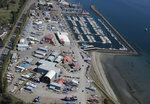People who spend time on the working waterfront know that when it comes to port district politics, contention is as predictable as the tides.
This year's general election campaign for a four-year …
This item is available in full to subscribers.
We have recently launched a new and improved website. To continue reading, you will need to either log into your subscriber account, or purchase a new subscription.
If you had an active account on our previous website, then you have an account here. Simply reset your password to regain access to your account.
If you did not have an account on our previous website, but are a current print subscriber, click here to set up your website account.
Otherwise, click here to view your options for subscribing.
* Having trouble? Call our circulation department at 360-385-2900, or email our support.
Please log in to continue |
|




People who spend time on the working waterfront know that when it comes to port district politics, contention is as predictable as the tides.
This year's general election campaign for a four-year seat on the Port of Port Townsend Commission has generated more waves than in recent elections.
Voters countywide choose between first-term incumbent Steve Tucker and challenger Diana Talley for the District 1 seat, which technically represents the Port Townsend area, but serves the entire district.
Tucker presents himself as a business professional who become involved with the port to represent people who own and trailer small boats, and is representative of people who do not necessarily have anything to do with the marine trades. He has a long list of endorsements in this nonpartisan election from former and current public officials, including all three Democratic county commissioners.
"My record should reflect that I started the long-term capital maintenance plan, worked hard in the environmental realm by introducing biochar, and made sound financial decisions like building the new administration building and refinancing our bonds," Tucker said last week. He has also been reaching out to the farming industry to see what the port could do, possibly on property at the airport, to assist growers and food processors.
Talley, who has been in the local marine trades industry for 25 years and is founder and past president of the Marine Trades Association (which is making no endorsements), said her connection to one of the county’s most important economic anchors is an asset. She owns Taku Marine. Talley has said she is sensitive to the interests of anyone who pays property tax to the port or uses a port facility.
"I think areas of the county, such as Quilcene, are underserved," Talley noted.
Tucker asserts that Talley, if elected, would give the marine trades too much influence on the three-member commission.
District 2 Commissioner Brad Clinefelter has been a shipwright, and has owned and operated Mystery Bay Charters and Services, providing marine consulting and support services.
District 3 Commissioner Pete Hanke owns and operates Puget Sound Express, a passenger ferry and whale-watch vessel operating out of Point Hudson Marina, where he also leases office space. He is also a pilot who has flown out of Jefferson County International Airport since 1988.
Hanke has endorsed Tucker.
On his campaign trail, Tucker said, he has heard a variety of questions about port business. "The one I hear most frequently is the one about two active members of the marine trades organization, which is a lobbying organization to get their issues to the commission, being on the commission at the same time," Tucker told the Leader. "Many people have indicated that this would be a conflict of interest. The commission only has three members. If two of them come from the marine trades organization, they will control the majority vote on anything that they want. Most folks find this to be a dangerous situation."
Talley said she has no agenda and no plans to align with any commissioner.
“I’m me,” Talley said last week. "I don't represent any particular group other than marine trades business owners."
ADMINISTRATION BUILDING
When it comes to Tucker's record of port leadership, Talley is not a fan of the administration building constructed a few years ago, and the administration in general, it seems.
"I don't believe the size of our port requires an executive director and a deputy director. It seems overburdened at the top," Talley said at a candidate forum in Quilcene.
"Whether I'm talking to someone who owns a boat or an airplane or just pays taxes, they wonder about administrative overhead," Talley said last week about what she's heard while on the campaign trail.
Tucker supports port administration, as he did the $1.1 million project to build and equip the administration building.
In 2005, the port commission decided to renovate the former hospital at Point Hudson, a 1930s building that was being used as a hotel, which, due to age and other factors, was condemned as an accommodation. The port maxed its borrowing capacity to finance the building’s renovation as an administrative office. Earlier this year, the port took advantage of favorable rates and refinanced the 2005 bond, paying it off and saving $450,000 in the process. The full debt is scheduled to be paid off in 2025; it could be earlier, subject to refinancing, noted Abigail Berg, port finance director.
Tucker said he championed the idea in 2013 of moving administrative offices back to the Port Townsend Boat Haven. The port borrowed $800,000 to build new in a location where one of the older commercial buildings had been tagged for removal. Federal and state agencies signed a 20-year lease for the admin building at Point Hudson, and the port has been applying the $11,484 monthly payments to the new admin project's debt. The current schedule has the new admin site paid off in November 2018.
"The new administration building was built from revenue that came from leasing out the old building," Tucker said. "The amount of revenue will completely pay off the new building in less than 10 years, and after that building is paid off, we will have continuing revenue of $1.3 million every 10 years. If we had just stayed there, we would have nothing."
Talley said she questioned the admin office moving to Point Hudson in the first place, yet questioned the finances and timing of the administrative move back to Boat Haven, and whether less-expensive options were considered.
PORT ADMINISTRATION
Larry Crockett, a retired U.S. Army officer, has been the port's executive director for nearly 16 years; he hired Jim Pivarnik, who has been deputy director for nearly 15 years. The three elected port commissioners hire the executive director, and that person is responsible for hiring staff.
It is natural along the waterfront – and this year in the election campaign for hospital commission – for candidates to question the role of an entity's administrators. (Crockett is on vacation and was unavailable last week for an interview.)
The Leader requested the previous two written performance reviews of both Crockett and Pivarnik, which are public documents.
Crockett was reviewed in 2011 by Commissioners John Collins, Dave Thompson and Leif Erickson, and was reviewed in 2012 by Commissioners Tucker, Thompson and Erickson. The present commission – composed of Tucker, Clinefelter and Hanke – has not conducted a written performance review, according to port records.
For his part, Tucker noted that in 2013 he was battling kidney cancer, successfully, and was preoccupied with that for a time. Looking back, "I suspect that the reason for no reviews is that Larry has not asked for a raise that would have prompted the review process," Tucker said last week.
REVIEW SUMMARY
Each of the two reviews has a rating system of 1 (poor) to 5 (exceptional).
The review category definitions and number of categories differ from 2011 to 2012. Crockett’s per-category ratings were higher in 2012 than in 2011.
In the 2011 review, his highest marks were for preparation and participation in port meetings; representing the port well; developing and maintaining effective liaison with government agencies, elected officials and community groups; and promoting and leading economic development.
His lowest marks in 2011 were for the question of regularly monitoring and evaluating the performance of departments in regard to goals and strategies; and in the management, marketing and development of port real estate.
In 2012, Crockett received the highest ratings for his preparation of data for commission meetings; for being a liaison with government agencies and community groups; for financial status and budget reports, including transparency; and for strong leadership in environmental stewardship.
He was rated lowest for his involvement with course of action on items and policies recommenced by department managers or staff; delegating responsibility and maintaining necessary control in how he deals with port managers, supervisors and staff, and in how he monitors and evaluates the performance of port departments in regard to established goals, strategies and morale/job satisfaction.
In terms of a Crockett review of Pivarnik, only one job performance review is on file, a review for 2014 that was conducted in January 2015. Crockett rated Pivarnik highly, including in this statement, "Jim is an outstanding deputy director. He is self reliant, a self-starter, understands our operation, the purpose of a port district, and uses a common sense approach to his work – he has my complete trust and confidence."
Crockett's annual salary in 2014 totaled $127,590.14, plus health insurance valued at $14,781.60.
Pivarnik's annual salary in 2014 totaled $96,824.64, plus health insurance valued at $14,781.60.
The director and deputy director also are allowed to submit claims to be reimbursed for port-related travel. For example, in 2014, Crockett submitted claims for mileage worth $2,657.20, and Pivarnik, for mileage costs totaling $1,729.84. Pivarnik noted that commission policy is for administrators to use personal vehicles for port-related business, including regular trips from Boat Haven to Point Hudson, the airport or port property in Quilcene.
Both candidates agree that money is an issue, for current operations and in terms of saving to replace key revenue-generating facilities. Rate and fee increases are being proposed. A public hearing on the 2016 budget takes place at 5:30 p.m., Wednesday, Oct. 28 at 333 Benedict St., Port Townsend.
SALARY SURVEY
This year, the budget decision includes reaction to a salary survey the commission received in June, which compares port employee salaries and jobs with other ports and small city governments.
"The takeaway is, executive management believes our employees are underpaid," Pivarnik said last week.
The Leader has examined the survey, which may not be a true "apples to apples" comparison, Pivarnik noted, because while ports may share job titles, job duties vary under those titles. Employee longevity and professional education are also variables.
Crockett is recommending to the commission that it address the inadequacies revealed in the survey by adding $63,000 in employee wages and benefits for each of the next three years. Whatever is done to address the survey is on top of the regular Consumer Price Index pay raises.
Crockett, Pivarnik and Berg are nonunion employees on salary; all other port employees are part of the Teamsters union and paid hourly.
"We've got a great relationship with the Teamsters," Pivarnik noted, and the salary step increases are negotiated. "Our union is our partner."
Tucker noted that executive staff, not the commissioners, set employee wages, and that he was "surprised to find out that we were behind." Tucker said the salary survey is now part of the budget process.
"A lot depends on how much revenue we can find. I think that, at the least, the positions with the greatest disparity will be addressed," Tucker said.